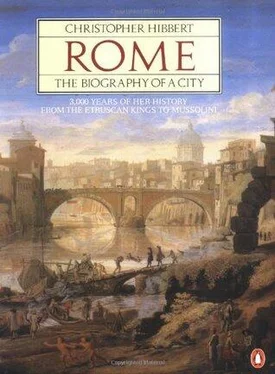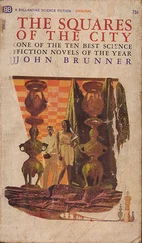Christopher Hibbert - Rome. The Biography of the City
Здесь есть возможность читать онлайн «Christopher Hibbert - Rome. The Biography of the City» весь текст электронной книги совершенно бесплатно (целиком полную версию без сокращений). В некоторых случаях можно слушать аудио, скачать через торрент в формате fb2 и присутствует краткое содержание. Жанр: Культурология, Искусство и Дизайн, на английском языке. Описание произведения, (предисловие) а так же отзывы посетителей доступны на портале библиотеки ЛибКат.
- Название:Rome. The Biography of the City
- Автор:
- Жанр:
- Год:неизвестен
- ISBN:нет данных
- Рейтинг книги:3 / 5. Голосов: 1
-
Избранное:Добавить в избранное
- Отзывы:
-
Ваша оценка:
- 60
- 1
- 2
- 3
- 4
- 5
Rome. The Biography of the City: краткое содержание, описание и аннотация
Предлагаем к чтению аннотацию, описание, краткое содержание или предисловие (зависит от того, что написал сам автор книги «Rome. The Biography of the City»). Если вы не нашли необходимую информацию о книге — напишите в комментариях, мы постараемся отыскать её.
Rome. The Biography of the City — читать онлайн бесплатно полную книгу (весь текст) целиком
Ниже представлен текст книги, разбитый по страницам. Система сохранения места последней прочитанной страницы, позволяет с удобством читать онлайн бесплатно книгу «Rome. The Biography of the City», без необходимости каждый раз заново искать на чём Вы остановились. Поставьте закладку, и сможете в любой момент перейти на страницу, на которой закончили чтение.
Интервал:
Закладка:
Soon after Sulla's death Italy was racked by another outbreak of savage violence which threatened to cost as many lives as the recent wars. It began in a barracks at Capua where captives, mostly Thracians and Gauls, were kept in appalling conditions and trained as gladiators. One day about eighty of these men broke out, armed themselves, first with spits and choppers from the cookhouse, then with gladiators' weapons from a convoy of wagons on its way to another city, and in the wild country of Lucania, south-east of Naples, defeated a small army of legionaries sent out against them from Rome. Slaves joined the gladiators, as did discontented herdsmen and shepherds, until their leader, Spartacus, a Thracian of high intelligence and some culture, had a formidable and well-armed multitude at his command. Spartacus would have taken them north across the Alps where they could have obtained their freedom. But, having defeated four armies, his men supposed themselves invincible and were content to remain in Italy ravaging the countryside. In 71 B.C., however, Spartacus was at last overwhelmed in Apulia, and six thousand of his followers were crucified along the Appian Way.
The Roman general who brought about this defeat was the enormously rich Marcus Licinius Crassus, an ingratiating and avaricious officer, who was assisted in the later stages of the campaign by another gifted and ambitious commander, the arrogant Cnaeus Pompeius, afterwards known as Pompey the Great, who took much of the credit for Spartacus's defeat. Pompey and Crassus might well have come to blows; but, both recognizing the advantages of cooperation, they agreed to demand to be elected consuls for the year 70 B.C. though neither, as commanders of armies in the field, was eligible for election and Pompey was additionally disqualified on the grounds of his youth. After their election, Crassus remained in Rome, increasing his fortunes and political standing, while Pompey sought further glory, first in the Mediterranean where, with a navy of five hundred ships, he stamped out the pirates whose insolent operations were interfering with Rome's grain supply, then in western Asia where, in the process of creating new provinces and dependent states and in founding new cities, he not only redrew the map of Rome's dominions beyond the Ionian Sea but also became even richer than Crassus. When he returned to Rome he was welcomed with a Triumph, the third he had been accorded, more magnificent than any the city had seen. Two whole days were set aside for it, yet even so there was not enough time to include all the spectacles prepared. At the head of the procession were carried placards with the names of the countries which the hero had brought within Rome's orbit, banners indicating the huge amounts of money these lands would bring to Rome in taxes, and standards inscribed with Pompey's victories over the pirates. Then came parades of priests and musicians, dancers and jesters; then sad, straggling lines of manacled prisoners, rows of pirate chiefs, and, as Plutarch listed them, ‘the wife and son and daughter of King Tigranes of Armenia, Aristobulus King of the Jews, a sister and five children of Mithridates, some Scythian women, hostages given by the Iberians, by the Albanians and the King of Comnagene. There were also great numbers of trophies, one for every battle in which Pompey had been victorious… But what seemed the greatest glory of all and one quite unprecedented in Roman history was that this third Triumph of his was over a third continent. Others before him had celebrated three Triumphs; but Pompey's first had been over Libya, his second over Europe, and now this last was over Asia, so that he seemed in a sense to have led the whole world captive.’
There had been fears in Rome that this great hero might establish an unlimited dictatorship as Sulla had done, and in his absence groups of patricians had intrigued with each other in efforts to prevent it. Among them was a corrupt, charming and devious candidate for the consulship, the radical Lucius Sergius Catilina. So widespread were the suspicions aroused by this shady and unprincipled character that a rival candidate, whose relatively humble origins had proved an insurmountable obstacle to the ambitions of less gifted men, was brought into prominence.
Marcus Tullius Cicero was the son of a retired country gentleman, none of whose ancestors had ever been Consul and whose pretensions to high office would, therefore, normally have been regarded by the Optimates as unbecoming in a so-called ‘new man’. But Cicero's gifts as an orator were quite exceptional; and by dint of constant, eager practice in the Forum, where he fluently pleaded cases in his supremely eloquent Latin before the Roman courts and deeply impressed the crowds who came to hear him, he had at the age of twenty-nine been elected Quaestor, and in 63 B.C., before he was forty-four, he had become Consul.
His disappointed, embittered rival, Catilina, endeavoured to gain the consulship the next year by promising all manner of sweeping reforms; but he was again defeated, and now, despairing of gaining power by conventional means, turned his thoughts to an insurrection by the discontented and the seizure of power in a coup d'état . When Cicero heard rumours of this plot he acted decisively by ordering the immediate arrest of the conspirators. Catilina himself had fled from Rome and was subsequently killed near Pistoia. But five of his accomplices were brought before the Senate. Cicero argued persuasively and brilliantly for the death sentence and, having got his way, went out to the waiting crowds to announce to tremendous cheers, ‘Vixerunt!’, ‘They are dead!’ He had been strongly supported in his arguments by Marcus Porcius Cato, a man as implacable and as rigid in his advocacy of Rome's antique traditions as his great-grandfather. Opposing him had been a young, recently elected Praetor, Gaius Julius Caesar.
TWO
IMPERIAL ROME
Caesar was a tall, handsome, tirelessly energetic man from a family which, while ancient and patrician, was not unduly rich. He wore his clothes with a kind of flamboyant elegance which in a later age would have been considered that of a dandy; and he took great trouble with the arrangement of his hair, which became increasingly scanty as he grew older. His political sympathies seemed to lie with the Populares but whether this tendency was due to conviction, to ambition or to family influences – his aunt had been married to Marius and his own wife was the daughter of Cinna – no one could be sure. Certainly the Dictator, Sulla, had not liked or trusted him, and his family had thought it as well to obtain for him a post away from Rome in Asia Minor where his obvious ambition and the disconcerting gaze of his dark, penetrating eyes would arouse less apprehension. There he had come to the notice of the homosexual King of Bithynia in whose bed, it was widely reported, he had spent many libidinous hours; and this supposed affair was to be held against him by his enemies throughout the coming years.
Yet after his return to Rome on Sulla's death he had soon gained a reputation in the courts as a talented pleader whose rather high-pitched voice was offset by firm, impassioned and eloquent gestures. To improve these oratorical skills he had gone to Rhodes to pursue his studies under a celebrated Greek rhetorician who taught on the island. He had certainly improved his skills; he had also become renowned for his ruthlessness: on the journey out his ship had been attacked by pirates who had held him to ransom. They had treated him well enough and had released him unharmed when the ransom was paid. But he had sworn that he would have his revenge; and, as soon as he could, he went after them with a company of soldiers he had raised for the purpose. He came upon them, captured them, and had them all crucified, their throats cut first by way of mercy.
Читать дальшеИнтервал:
Закладка:
Похожие книги на «Rome. The Biography of the City»
Представляем Вашему вниманию похожие книги на «Rome. The Biography of the City» списком для выбора. Мы отобрали схожую по названию и смыслу литературу в надежде предоставить читателям больше вариантов отыскать новые, интересные, ещё непрочитанные произведения.
Обсуждение, отзывы о книге «Rome. The Biography of the City» и просто собственные мнения читателей. Оставьте ваши комментарии, напишите, что Вы думаете о произведении, его смысле или главных героях. Укажите что конкретно понравилось, а что нет, и почему Вы так считаете.












